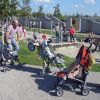WeQ – more than IQ
A new German movement is striving for a cultural shift away from the “I society” towards the “we society”.

Anne has got rid of her car, but whenever she needs one she can get one from the car-sharing scheme. She cultivates the garden behind her apartment house with neighbours, and sometimes they also cook and eat the home-grown potatoes, onions and courgettes together. Only Sebastian has bought a powerful drill, while Anne has a large ladder and her friend Julia owns a small jigsaw. When one of them needs something, it is borrowed and shared. Before she goes on vacation, she empties the kitchen and deposits the food in a public refrigerator where the needy can help themselves. Reading material for the journey can be found in a disused telephone box that now serves as a public book shelf, where she also brings the books she doesn’t want to read any more. Because she doesn’t have a family, she is active in a local neighbourhood association, goes shopping for others and accompanies old people to the doctor. As a result, she collects “time tokens” that she can redeem when she needs help herself.
The new social megatrend
What is often referred to under the headings “citizens’ assistance”, “sharing economy” and “urban farming” has also begun to have an impact on the economy. Crowdfunding, the financing of an enterprise with the help of many small investors; coworking spaces, which does not only involve people working on new ideas next to one another, but also together; and open systems or open source are key words and ideas of a new movement towards a new way of thinking about social and economic life under the heading “WeQ – more than IQ”. WeQ is the new social megatrend – at least, that is what its advocates believe.
The WeQ Foundation was officially established at the end of April 2015, seven months after the first public presentation of the WeQ idea at the Vision Summit 2014. Its founders are the neuroscientist and author of popular scientific bestsellers Gerald Hüther, the educational researchers and foundation chairwoman Helga Breuninger, Ulrich Weinberg (professor at the HPI School of Design Thinking ), social entrepreneur Marianne Obermüller (Schokolade hilft immer), David Diallo (Noah Foundation), Detlef Gürtler (journalist) and Peter Spiegel (sociologist, futurologist, Genisis Institute). Spiegel describes the WeQ initiative as a “circle of trailblazers and implementation pioneers who would like to set in motion a fundamental cultural shift away from the ‘I society’ and towards the ‘we society’.”
“Unlike IQ, WeQ emphasises the quality of the group, ‘we’ rather than ‘I,’” says Helga Breuninger, chairwoman of the Breuninger Sifting. The central focus, she explains, is on the connection, the creation of synergies, working on a joint solution, the sharing of goods and products. It is a counter movement to egocentric thinking. Matthias Horn’s Zukunftsinstitut recently published a study by Kirsten Brühl entitled “Die neue Wir-Kultur” (The New We-Culture) in which the economist and author examines the network economy and its impacts on businesses.

